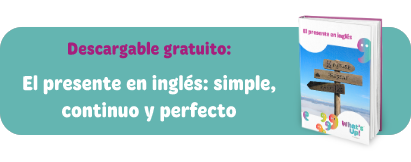What's Up! blog
el mejor contenido del mejor curso de inglés
Presente simple: repásalo con ejercicios
El presente simple es el tiempo verbal más común del inglés. Seguramente ya lo hayas estudiado, pero nunca está de más un poco de práctica.
Repaso
El presente simple es fácil de usar porque no hay que conjugar el verbo, se usa en su forma base. Solo tienes que recordar añadir «-s» si es la tercera persona del singular. Algunas veces hay que añadir «-es» o cambiar una «y» por «i» antes de añadir la terminación de tercera persona:
- To catch: I never catch the ball.
- To play: You always play videogames in the evening.
- To buy: She only buys second-hand clothes.
- To hurry: She hurries too much.
- To watch: She never watches any series.
Lo usamos para hablar de verdades o creencias generales, actividades cotidianas, programas y horarios. Es muy fácil de confundir con el presente continuo en algunos contextos, así que presta atención: si la frase se refiere a algo general, constante, habitual o cotidiano, se usa el presente simple, pero si es algo temporal, del momento o inmediato, se usa el continuo:
- I work at a restaurant.
- I am a teacher, but I am working as a shop assistant right now.
- I always study in the evenings.
- I am studying a lot these days.
¿Lo tienes claro ya? Te proponemos unos cuantos ejercicios para que practiques.
Fill in the gaps
Rellena los huecos de las siguientes frases con la forma correcta de los verbos entre paréntesis. Tendrás que decidir si corresponde por contexto un presente simple o continuo. Tienes las respuestas al final.
- I _________________ (not belong) to a political party.
- Hurry! The bus _______________ (come). I ____________ (not want) to miss it.
- The River Nile _____________________ (flow) into the Mediterranean.
- The river _________________ (flow) very fast today, more than usual.
- ____________________ (it snow) in India?
- We usually ________________ (grow) vegetables in our garden.
- I can’t drive, but I _________________ (learn).
- You can borrow my umbrella, I _________________ (not need) it.
- I usually ____ (love) parties but I _____________(not enjoy) this one very much.
- My parents ____________ (live) in Bristol, they have never lived anywhere else.
Visita turística
Si aún necesitas practicar un poco, te proponemos una actividad entretenida que hacer en grupo o en solitario. Imagina que has recibido una visita de alguien que viene de un país muy diferente al tuyo. Si tienes con quién practicar, turnaos para hacer el papel de turista y de guía. El guía explica cosas culturales propias, y el turista hace preguntas. Si no tienes con quién practicar, escribe las cosas que creas que un turista necesitaría saber, y después revisa para ver si lo tienes todo bien.
Respuestas
- I do not belong to a political party.
- Hurry! The bus is coming. I do not want to miss it.
- The River Nile flows into the Mediterranean.
- The river is flowing very fast today.
- Does it snow in India?
- We usually grow vegetables in our garden.
- I can’t drive, but I am learning.
- You can borrow my umbrella, I do not need it.
- I usually love parties but I am not enjoying this one very much.
- My parents live in Bristol, they have never lived anywhere else.
Posts relacionados:
- Inglés en los negocios: have something done exercises y explicación
- Números ordinales en inglés: aprende a escribirlos correctamente



